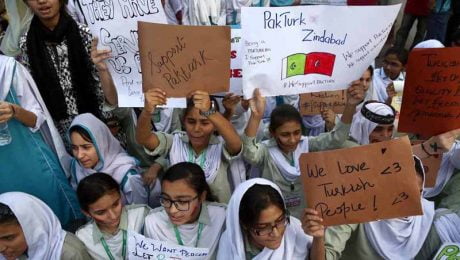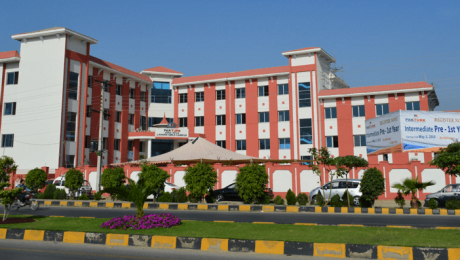Keyword: Persecution of Hizmet by Erdogan

Pakistan – Of friends and us
A student at the Pak-Turk School in Lahore was perplexed at the abrupt deportation of all Turkish teachers at the request of the Turkish President Erdogan. “The Pak-Turk School changed my outlook in life. The teachers were more than simply teachers, they were mentors and helped students in all aspects of life,” this student exclaimed. “Why are they kicking out my teachers who have done so much for my country?” he wondered.

Farewell of Pak-Turk Teachers: Symbolic Burial of a Heart
All the parents were depressed and disappointed at the forced exit of Turkish staff. They looked sad with tearful eyes bade farewell to the Turkish staff. Mr. Osman Arslanhan along with the other Turkish staff made a symbolic burial of a heart which was full of hearty wishes of the Turkish staff and drawings made by the Turkish children. The heart was buried with tears in the eyes by all the Turkish staff.

Our three-month ordeal in Turkey’s maximum prison -Nigerian students detained over coup saga
Notwithstanding such aims and the benefits to Turkish citizens and others around the globe who enjoy scholarship and the benefits of quality education, all such pro-Gülen educational organisations, including the ones established in Nigeria have been branded as enemies by the Turkish government. “I have never heard that the Turkish schools in Nigeria have done anything illegally since the time they began operation in Nigeria; I attended one of such excellent schools so, I see no reason why the school should be closed,” Mohamed said.

Turkey’s post-coup brain drain
Bekir Cinar was working as an assistant professor at the political sciences department of Suleyman Sah University when it fell victim to the crackdown. He says that many academics with different views were working at the university. Cinar is currently continuing his scientific work at a British university. He considers this a major loss for Turkey, not least because it takes 20 to 30 years to become an academic.

Peshawar High Court halts government order to deport Pak-Turk school staff
Petitioner counsel Qazi Muhammad Anwar argued that all the Turkish teachers are very peaceful people who have committed no crime in Turkey as well as here in Pakistan.” He prayed the bench to suspend the federal government’s notice and stop deportation of the Turkish teachers and their families. The bench accepted the request and restrained the deportation of Pak-Turk schools’ staff.

EU, US Have Little Leverage as Turkish Democracy Backslides
“In the big picture, Erdogan knows that the EU needs Turkey and will come back begging for a new agreement on the migrants. That’s why he will play a game of brinksmanship,” said Soner Cagaptay, the director of the Turkish program at The Washington Institute.

Turks seek asylum in South Africa
Turkish businessmen fleeing arrest in their country for links to an alleged terrorist organisation are trying to set up a new life and open companies in South Africa. Speaking on condition of anonymity to Weekend Argus, a few of the businessmen explained how the Turkish government seized their homes and businesses. The businessmen say some of their families are still at risk back home.

Pakistan Today Editorial: The Turkish connection and Turkish schools
Surely nobody at the joint session really believed Mr Erdogan’s warning about the threat the so called Gullen Network presents Pakistan. No doubt the Turkish president really believes the Network – which ran schools here till just before his visit – is just as dangerous for Pakistan as al Qaeda, etc.

Tears and sadness as Turkish people pack up to leave Pakistan
“I know I can’t do anything to persuade the federal government to take back its decision of expelling the Turkish teachers and their families from the country,” a senior Pakistani teacher told PTI. “I must say last Friday was the saddest day in our campus in Lahore as all Turkish students were literally crying,” she said.

Parents protest deportation of Pak-Turk School’s teachers, staff
Slamming the government’s decision of deporting Turkish teachers and staff from the country, parents said “Pak-Turk Schools were founded without any financial assistance of Turkey and Pakistani government but founded by the philanthropist donations of people of Pakistan and Turkey” adding that these schools were the property of Pakistani people.

Hizmet and Turkey’s relations with Nigeria
Apart from establishing most successful educational institutions in Nigeria, the Hizmet Movement, which is also referred to as Gulen Movement, has been in the fore-front in propagating modern face of Islam, while at the same time building bridges of peace through interfaith dialogue.

Erdogan’s ego eclipses Pakistan-Turkey ties
In Pakistan, where more than 27 million children remain out of school, every teacher and educational institution matters. The Turkish non-governmental schools in question are ranked among the best in terms of in infrastructure, as well as quality of education and character-building.

Protests against likely closure of Pak-Turk schools in Pakistan
The Pak-Turk school network students and their parents’ protested against the likely closure of the educational set-up following the two-day state visit by Turkish President Recep Tayyip Erdogan and the federal government’s decision to deport teachers affiliated with Pak-Turk International Schools and Colleges.

Turkey crackdown: Gulen sympathizers abroad are feeling the heat
Turkey’s relentless pursuit of US-based cleric Fethullah Gulen’s supporters during the past four months – both at home and abroad – has now resulted in Turkish military personnel serving at NATO bases seeking asylum, fearing persecution if they return home.


















